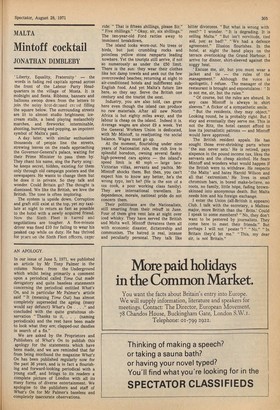MALTA
Mintoff cocktail
JONATHAN DIMBLEBY
' Liberty, Equality, Fraternity' — the words in fading red capitals spread across the front of the Labour Party Headquarters in the village of Mosta. It is midnight and fiesta. Ribbons, banners and balloons swoop down from the letters to join the noisy best-drcssed crcwd filling the square below. The surrounding streets are lit to almost studio brightness; icecream stalls, a band playing melancholy marches, and fireworks: interminable, shooting, bursting and popping, an impotent symbol of Malta's past.
A day later, with similar enthusiasm thousands of people line the streets, strewing leaves on the roads approaching the Governor-General's palace, waiting for their Prime Minister to pass them by. They chant his name, sing the Party song : he keeps secret, hidden, existing for them only through old campaign posters and the newspapers. He wants to change them but he does it in private. So they talk and wonder. Could Britain go? The thought is dismissed. We like the British, we love the British. The tone is often imploring.
The system is upside down. Corruption and graft still exist at the top, yet my taxilate at night to return as fast as possible to the hotel with a newly acquired friend. Now the Sixth Fleet is tarred and negotiations are tougher. A five-minute driver was fined 610 for failing to wear his peaked cap while on duty. He has thrived for ycars on the Sixth Fleet officers, eager ride: " That is fifteen shillings, please Sir." " Five shillings." " Okay, sir, six shillings." The ten-year-old Ford rattles away to imminent breakdown.
The island looks worn-out. No trees or birds, but just crumbling rocks and pointless yellow stone ramparts leading nowhere. Yet the tourists still arrive, if not so numerously as under the E50 limit. There is the sun: they wear their clothes like hot damp towels and seek out the few overcrowded beaches; returning at night to air-conditioned hotels and indifferent subEnglish food. And yet Malta's future lies here, so they say. Serve the British one century and the tourist the next.
Industry, you are also told, can grow here even though the island can produce no raw materials. After all new North Africa is but eighty miles away, and the labour is cheap on the island. Indeed it is. Average wages are about E9 a week. Yet the General Workers Union is dedicated, with Mr Mintoff, to readjusting me social balance. Wages must go up.
At the moment, flourishing under nine years of Nationalist rule, the rich live in splendid boredom, owning several flashy, high-powered cars apiece — the island's speed limit is 40 mph — large lateVictorian villas, servants and yachts. Mr Mintoff shocks them. But then, you can't expect him to know any better, he's the wrong type, isn't he? (He is the son of a sea cook, a poor working class family). They are international travellers. Independence, morale, national pride do not concern them.
Their politicians are the Nationalists, still smarting from their rebuff in June. Four of them give vent late at night over iced whisky. They have served the British and Malta well. Mintoff threatens them all with economic disaster, dictatorship and communism. The hatred is real, intense and peculiarly personal. They talk like bitter divorcees. "But what is wrong with rent? " I wonder. "It is degrading. It is selling Malta." " But isn't servitude, tied aid, just as bad?" "We had a defence agreement." Illusion flourishes. In the hotel, at night the band plays on the terrace overlooking the Grand Harbour. I arrive for dinner, shirt-sleeved against the soggy heat.
'Excuse me, sir, but you must wear a jacket and tie — the rules of the management." Although the voice is apologetic, I refuse. The manager of the restaurant is brought and expostulates : ' It is not me, sir, but the rules."
"Of course, but the rules are absurd. In any case Mintoff is always in shirt sleeves." A flicker of a sympathetic smile.
"But the residents, they may object." Looking round, he is probably right. But I stay and eventually they serve me. This is not the Ritz, the hotel cannot afford to lose its journalistic patrons — and Mintoff would have approved.
The British resident appals. He has sought those ever-shrinking parts where 'the sun never sets.' He is retired, pays sixpence in the pound income tax, likes the servants and the cheap alcohol. He fears Mintoff and wonders what would happen if the British were to withdraw. He respects 'the Malts' and hates Harold Wilson and all that extremism.' He "lives in small chromium bars, in bored make-believe, no roots, no family, little hope, fading brownskinned into anonymous death. But Malta needs him and his foreign exchange.
I enter the Union (all-British it appears) Club. I talk with the secretary, a Maltese major, more British than the 'Brits.' Could I speak to some members? "No, they don't want to be pestered by journalists. They come here to meet their friends." But perhaps I will not ' pester '? " " No." "In Britain they'd let me." "This, my dear sir, is not Britain."


































 Previous page
Previous page